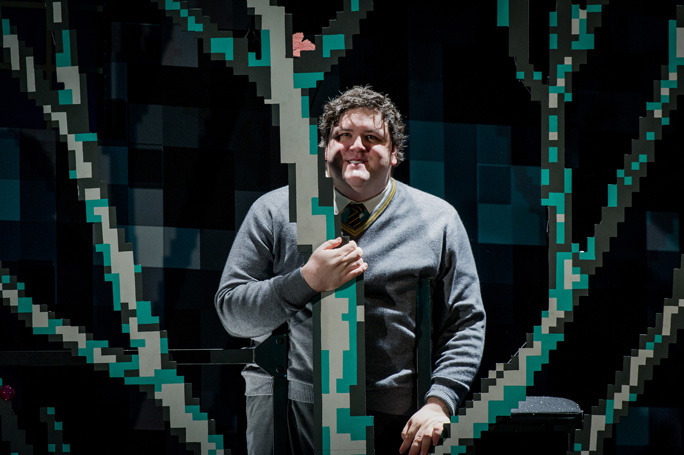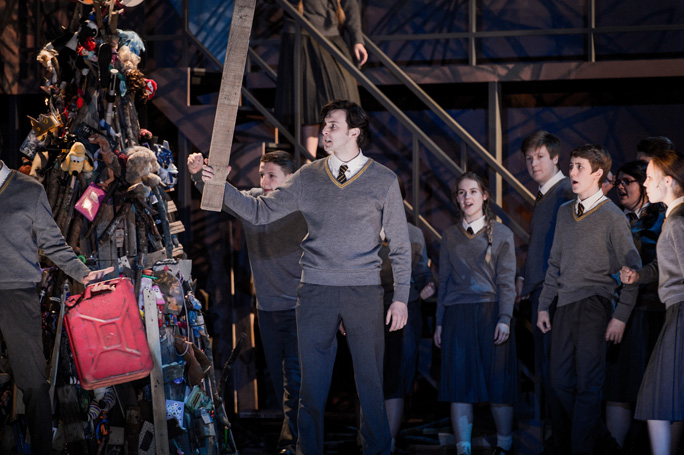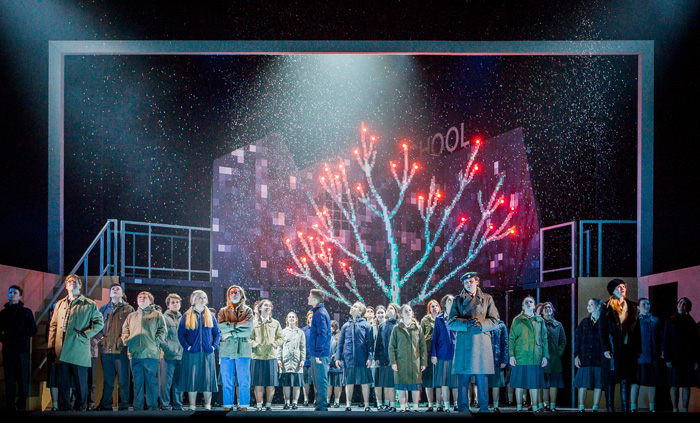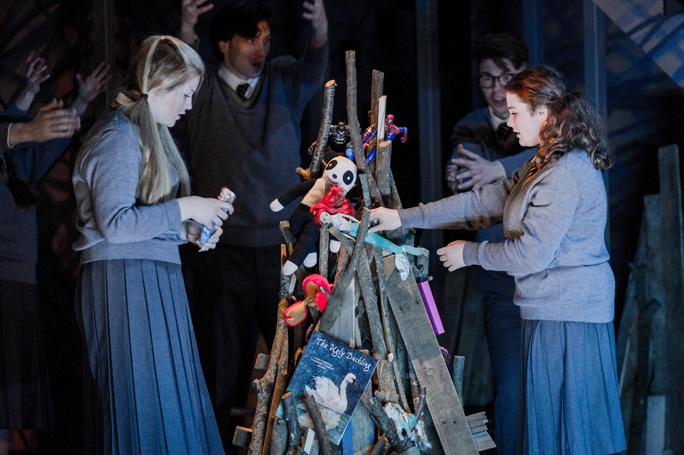Brand-new youth operas tend to fall into two types. One is hugely rewarding for the participants, a skill learned and a treasurable group experience to be remembered for the rest of their lives, as well as for their friends and family in the audience. The other, a rarer breed, does all that but also takes a gripping subject transformed by that strange alchemy of operatic setting, stunningly well performed by singers and players alike, and sears everyone who sees it with its special intensity. Nothing fits the latter bill like no other work of its kind I've seen.
That's saying something if you bear in mind that Glyndebourne's education department has been blazing a trail since its inception by Katie Tearle in 1986, supporting its young team with the peerless forces of its stage crew, music staff and input from top directors, designers, conductors and composers. Stephen Walsh was similarly impressed by Orlando Gough's Imago in 2013. For this year's all too limited airing, David Bruce and his librettist Glyn Maxwell hit on a masterpiece. Danish-born Janne Teller's young adult novel of the same name asks the most powerful existential questions already being raised by children and adolescents – what or who am I, what is the meaning of life – through the medium of a superficially simple tale which has the qualities of timeless myth, yet is also rooted in the present.  The 14-year-olds of Class 7A in a Danish provincial school find themselves discombobulated when strange Pierre Anthon leaves their number "the day he realized that nothing was worth doing because nothing meant anything anyway". He sits in a plum tree (Stuart Jackson pictured above right) like an old Greek cynic challenging his former classmates to find meaning in the form of precious objects which they sacrifice to a large pile; they decide, in the opera at least, that they'll cry when it all goes up in smoke because of their sacrifices' significance. The boundaries are smashed and language is blurred as the group egging-on mounts to ever more outrageous challenges.
The 14-year-olds of Class 7A in a Danish provincial school find themselves discombobulated when strange Pierre Anthon leaves their number "the day he realized that nothing was worth doing because nothing meant anything anyway". He sits in a plum tree (Stuart Jackson pictured above right) like an old Greek cynic challenging his former classmates to find meaning in the form of precious objects which they sacrifice to a large pile; they decide, in the opera at least, that they'll cry when it all goes up in smoke because of their sacrifices' significance. The boundaries are smashed and language is blurred as the group egging-on mounts to ever more outrageous challenges.
Mob violence in the face of the outsider's mysterious, maddening detachment makes a marvellous topic for an opera involving a large ensemble of schoolchildren, here led by five young professional singers straight out of music college and underpinned by an orchestra conducted by Sian Edwards, the Southbank Sinfonia, which sounds totally professional and yet contains many players as young as their counterparts onstage. The choruses and bit parts are marvellously singable, tonal even when something else more sinister is going on down in the pit, and though they start out with a shade too much hey-nonny-nonny pastoral innocence – and heaven knows young teens are never entirely that – they gradually metamorphose into a group anger which comes close to the visceral intensity of Peter Grimes. The solos, too, are variable as music, from a too-bland song for guitarist and Beatles fan Johan (the countertenor James Hall, flawless like his colleagues) via Rake's Progressy chamber arias meshing with beautiful woodwind writing for Pierre – full of Peter Quint-like vocal allure from tenor Stuart Jackson, not at all the yelling misfit of the book – and weak voice of reason Agnes (Robin Allegra Parton) to the devastating lament-into-mad-scene of poor Ursula (the very promising mezzo Marta Fontanals-Simmons) as she laments the disinterment of her dead dog.
The solos, too, are variable as music, from a too-bland song for guitarist and Beatles fan Johan (the countertenor James Hall, flawless like his colleagues) via Rake's Progressy chamber arias meshing with beautiful woodwind writing for Pierre – full of Peter Quint-like vocal allure from tenor Stuart Jackson, not at all the yelling misfit of the book – and weak voice of reason Agnes (Robin Allegra Parton) to the devastating lament-into-mad-scene of poor Ursula (the very promising mezzo Marta Fontanals-Simmons) as she laments the disinterment of her dead dog.
This is one of many areas where the libretto plays safer than the novel; Teller makes the "sacrifice" the much more horrifying one of the other kids digging up the coffin of Ursula's young brother to add to the pile (an old dog guarding its master's grave gets involved in the ritual too). Oddly Maxwell prefers to stick to stereotypes – all the boys at first choose superheros and action-men models to throw on the "pile of meaning", the girls select girly things – whereas Teller extends the participants to include an effeminate boy and a Muslim who gets beaten black and blue at home for having to hand over his prayer mat. This part of Sussex, needless to say, is less multi-culti than provincial Denmark, so the representation on stage is also less mixed, to put it mildly.
Even so, the dramatic trajectory reaches shattering heights in Act II, and the teenagers give it everything they have, keenly directed by Bijan Sheibani of Emil and the Detectives fame. Bass-baritone Tristan Hambleton as Karl (pictured above in the centre), coalescing the forced offerings of a patriotic boy's flag and a religious kid's church crucifix, dominates with a dark malignancy as the compulsions peak in what essentially is a rape and a murder.

Curiously, given music's avowed power to express ambiguity more powerfully than words, it's the novel which is more horrifically alluring in its fluidity. But Bruce manages to run a stylistic gamut without sounding too pastichey, even if he does virtually quote the trills of Zerlina's second aria in Don Giovanni and a strutting number from Stravinsky's Mavra.
Pierre's cosmic vision that begins the opera and returns even more persuasively at a key point in the action, Wagner's oceanic pull via John Adams, evokes a music-of-the-spheres "something" rather than the avowed nothing. The contrasts widen between his obdurate solos and the mounting aggression of the group, paralleled in scenes on the Giles Cadle-designed revolving stage that move between the plum tree and the disused sawmill where the rites of passage are enacted. The epilogue (pictured above), which takes us beyond the eerily dominant Act II chorus of "we heard about it; we were not there", is deeply satisfying. Interesting: as I write I feel it hard to let go of the experience. We need to see it again, and soon. Bravo, Glyndebourne.














Add comment